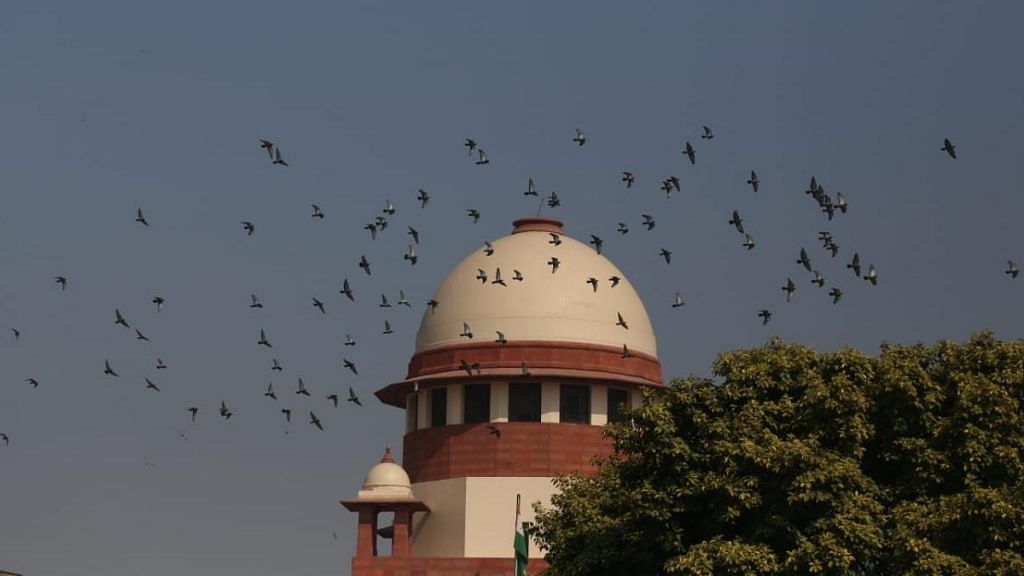New Delhi: Noting that “affluents” within the Scheduled Castes (SCs) and Scheduled Tribes (STs) are not permitting benefits to “trickle down to the needy”, the Supreme Court Wednesday observed that the government was “duty bound” to revise the SC/ST lists.
The observation was made in the case challenging the erstwhile Andhra Pradesh government’s decision to provide 100 per cent reservation to ST candidates for the post of teachers in schools in the scheduled areas.
The five-judge bench comprising Justices Arun Mishra, Indira Banerjee, Vineet Saran, M.R. Shah and Aniruddha Bose observed that “by now, there are affluents and socially and economically advanced classes within Scheduled Castes and Scheduled Tribes”.
“Thus, there is a struggle within, as to worthiness for entitlement within reserved classes of scheduled castes and scheduled tribes and other backward classes,” it added.
The court then agreed with the contention put forth by Rajeev Dhawan, who was appearing on behalf of the Telangana government, that the government is required to revise these lists. However, the court said that this can be done without disturbing the percentage of reservation.
This needs to be done “so that benefits trickle down to the needy and are not usurped by those classes who have come up after obtaining the benefits for the last 70 years or after their inclusion in the list”, it said.
It then observed, “The Government is duty bound to undertake such an exercise as observed in Indra Sawhney (supra) and as constitutionally envisaged. The Government to take appropriate steps in this regard.”
Also read: From virtual benches to entry curbs — how SC and Delhi HC will work after lockdown
Govt ‘duty bound’ to conduct reviews
The Supreme Court noted that Article 341(1) of the Constitution allows the President, after consultation with the Governor, to specify “the castes, races, tribes or parts of groups within castes or races” to be included in the Scheduled Caste category for that State or Union Territory. Clause 2 of Article 341 allows the Parliament to exclude or include any caste, race or tribe from this list.
Articles 342 and 342A lay down similar provisions for Scheduled Tribes and socially and educationally backward classes respectively.
The court referred to the judgment in Indra Sawhney v. Union of India (1992), in which the 9-judge bench had observed that these lists “are not meant to be sacrosanct and unalterable”. The court had also asserted that it would be the “duty” of the central government to look into the recommendations made by the commissions appointed by the state governments to delete or add certain castes, communities or classes.
The court also cited the judgment in Union of India & Ors. v. Rakesh Kumar & Ors., in which the apex court had observed that “these affirmative action measures should be periodically reviewed and various measures modified or adapted from time to time in keeping with the changing social and economic conditions”.
On Wednesday, the court therefore observed, “The Government is duty-bound to undertake such an exercise as observed in Indra Sawhney (supra) and as constitutionally envisaged. The Government to take appropriate steps in this regard.”
Also read: ‘Drop-a-pin’ on Google Maps, video call cops: Delhi HC tells convict released over Covid fears
Mere ‘reiteration’ or ‘judicial foray’ into policy?
Advocate Harpreet Singh Gupta, who represented the Scheduled Tribes teachers in the Supreme Court told ThePrint that the top court has only reiterated the law while quoting its earlier judgments.
“The court while talking about revision of lists has not said anything new, they have merely reiterated the law as per the case of Indra Sawhney and Rakesh Kumar,” he said.
Gupta added that the power of revision that the court talks about already exists with the Parliament. “The court has cautioned against a rigid approach with regard to the lists and has reminded the Parliament of its duty to revise the same to ensure that the benefits of reservation actually trickle down to the needy,” he said.
Constitutional expert Faizan Mustafa also asserted that revision of lists is permissible, but added that courts shouldn’t venture into policy-making.
“Revision of lists is certainly permissible and may be undertaken but there is danger of SC/ST reservation getting diluted and exclusion of creamy layer being extended to SC/ST reservation. The list preparation is an executive function and ideally courts should leave such policy decisions to the wisdom of government,” he said.
Also read: Migrants, medics and even zoo animals, SC has heard PILs for every kind of case in lockdown
